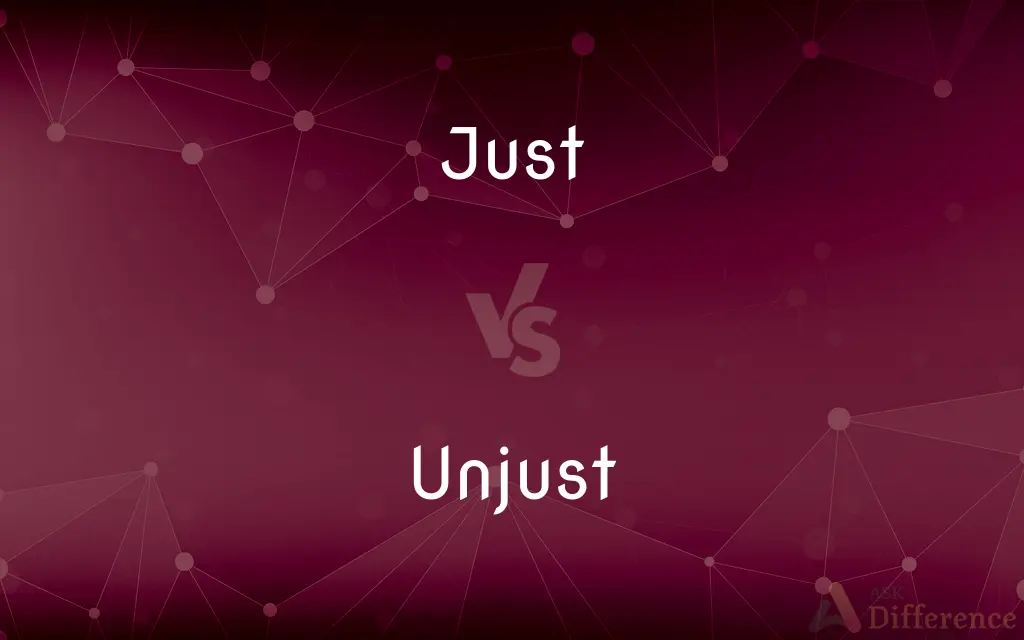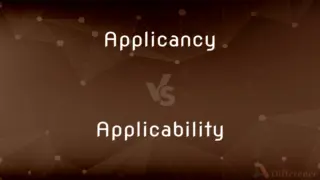Just vs. Unjust — What's the Difference?
Edited by Tayyaba Rehman — By Fiza Rafique — Updated on April 5, 2024
Just actions are based on fairness, law, or morality, promoting equity and righteousness, while unjust actions are characterized by unfairness, violation of rights, or moral wrongness, leading to inequality or harm.

Difference Between Just and Unjust
Table of Contents
ADVERTISEMENT
Key Differences
A just action or situation is one that is deemed fair, equitable, and in alignment with moral and ethical standards or the law. It implies a sense of righteousness, where all individuals are treated equally and their rights are respected. Just actions often involve fairness in decision-making, equality, and adherence to principles that ensure individuals' dignity and rights are upheld. On the other hand, unjust actions or situations involve a breach of fairness, equity, or moral principles. These actions lead to discrimination, inequality, or suffering, often violating individuals' rights and dignity. Unjust actions can stem from personal bias, systemic inequality, or disregard for the law and ethical norms.
While justice seeks to promote balance and rectify wrongs, ensuring that everyone receives what they are due according to laws or moral principles, injustice introduces or perpetuates imbalance, often benefiting some at the expense of others. For instance, a just legal system aims to treat all individuals equally before the law, providing fair trials and appropriate consequences for wrongdoing, whereas an unjust system might show bias, corruption, or discrimination, leading to unequal treatment and outcomes.
In the context of social justice, just actions strive to create a society where resources and opportunities are distributed equitably, and everyone's rights are protected. In contrast, unjust actions or policies contribute to social disparities, limiting access to resources and opportunities for certain groups based on race, gender, socioeconomic status, or other characteristics.
The assessment of what is just or unjust often depends on cultural, societal, and personal values and norms, which can vary widely across different contexts. However, the underlying principle of justice involves the fair and equitable treatment of all individuals, promoting peace, cooperation, and coexistence, whereas injustice undermines these values, leading to conflict, division, and suffering.
Comparison Chart
Definition
Actions based on fairness, law, or morality.
Actions characterized by unfairness or moral wrongness.
ADVERTISEMENT
Key Characteristics
Fairness, equality, adherence to ethical standards.
Discrimination, inequality, violation of rights.
Outcomes
Promotes equity, rights protection, and righteousness.
Leads to inequality, harm, and rights violations.
Social Implications
Contributes to social harmony and equitable distribution of resources.
Creates or perpetuates social disparities and conflict.
Examples
Fair trials, equal opportunities, unbiased policies.
Systemic discrimination, corruption, biased decision-making.
Compare with Definitions
Just
Reflecting or showing justice.
Her decision was just, taking into consideration both parties' perspectives.
Unjust
Undeserved or inappropriate in the circumstances.
The criticism was unjust, as she had performed her duties well.
Just
Guided by truth, reason, justice, and fairness.
The just treatment of all employees regardless of position ensures a positive work environment.
Unjust
Not based on or behaving according to fairness or justice.
The unjust law disproportionately affected marginalized communities.
Just
Deserved or appropriate in the circumstances.
The punishment was just, fitting the severity of the crime.
Unjust
Characterized by unfairness or injustice.
Unjust treatment of prisoners is a violation of human rights.
Just
Based on or behaving according to what is morally right and fair.
A just society provides equal opportunities for all its citizens.
Unjust
Leading to moral wrongness or societal harm.
Ignoring the needs of the vulnerable is an unjust action by the government.
Just
Ensuring moral rightness and benefit to society.
Advocating for just policies helps address systemic inequalities.
Unjust
Lacking fairness or equity.
The distribution of resources was unjust, favoring certain groups over others.
Just
Honorable and fair in one's dealings and actions
A just ruler. ].
Unjust
Being in violation of principles of justice or fairness; unfair
An unjust law.
Just
Variant of joust.
Unjust
Acting in violation of such principles; unfair in one's dealings and actions
An unjust ruler.
Just
Factually right, correct; factual.
It is a just assessment of the facts.
Unjust
(Archaic) Faithless; dishonest.
Just
Rationally right, correct.
Unjust
Not fair, just or right.
The solution was very unjust.
Just
Morally right; upright, righteous, equitable; fair.
It looks like a just solution at first glance.
Unjust
Acting contrary to the standard of right; not animated or controlled by justice; false; dishonest; as, an unjust man or judge.
Just
Proper, adequate.
Unjust
Contrary to justice and right; prompted by a spirit of injustice; wrongful; as, an unjust sentence; an unjust demand; an unjust accusation.
Just
Only, simply, merely.
Plant just a few tomatoes, unless you can freeze or dry them.
He calls it vermilion, but it's just red to me.
Unjust
Not fair; marked by injustice or partiality or deception;
Used unfair methods
It was an unfair trial
Took an unfair advantage
Just
(sentence adverb) Used to reduce the force of an imperative; simply.
Just follow the directions on the box.
Unjust
Violating principles of justice;
Unjust punishment
An unjust judge
An unjust accusation
Just
Used to convey a less serious or formal tone
I just called to say "hi".
Unjust
Not equitable or fair;
The inequitable division of wealth
Inequitable taxation
Just
Used to show humility.
Lord, we just want to thank You and praise Your Name.
Unjust
Not righteous;
`unjust' is an archaic term for `unrighteous'
Just
(degree) absolutely, positively
It is just splendid!
Just
Moments ago, recently.
They just left, but you may leave a message at the desk.
Just
By a narrow margin; closely; nearly.
The fastball just missed my head!
The piece just might fit.
Just
Exactly, precisely, perfectly.
He wants everything just right for the big day.
Just
(slang) Expressing dismay or discontent.
Just
A joust, tournament.
Just
To joust, fight a tournament.
Just
Conforming or conformable to rectitude or justice; not doing wrong to any; violating no right or obligation; upright; righteous; honest; true; - said both of persons and things.
There is not a just man upon earth, that doeth good, and sinneth not.
Just balances, just weights, . . . shall ye have.
How should man be just with God?
We know your grace to be a man.Just and upright.
Just
Not transgressing the requirement of truth and propriety; conformed to the truth of things, to reason, or to a proper standard; exact; normal; reasonable; regular; due; as, a just statement; a just inference.
Just of thy word, in every thought sincere.
The prince is here at hand: pleaseth your lordshipTo meet his grace just distance 'tween our armies.
He was a comely personage, a little above just stature.
Fire fitted with just materials casts a constant heat.
When allThe war shall stand ranged in its just array.
Their names alone would make a just volume.
Just
Rendering or disposed to render to each one his due; equitable; fair; impartial; as, just judge.
Men are commonly so just to virtue and goodness as to praise it in others, even when they do not practice it themselves.
Just
Precisely; exactly; - in place, time, or degree; neither more nor less than is stated.
And having just enough, not covet more.
The god Pan guided my hand just to the heart of the beast.
To-night, at Herne's oak, just 'twixt twelve and one.
Just
Closely; nearly; almost.
Just at the point of death.
Just
Barely; merely; scarcely; only; by a very small space or time; as, he just missed the train; just too late.
A soft Etesian galeBut just inspired and gently swelled the sail.
Just
To joust.
Just
A joust.
Just
Used especially of what is legally or ethically right or proper or fitting;
A just and lasting peace
A kind and just man
A just reward
His just inheritance
Just
Implying justice dictated by reason, conscience, and a natural sense of what is fair to all;
Equitable treatment of all citizens
An equitable distribution of gifts among the children
Just
Free from favoritism or self-interest or bias or deception; or conforming with established standards or rules;
A fair referee
Fair deal
On a fair footing
A fair fight
By fair means or foul
Just
Of moral excellence;
A genuinely good person
A just cause
An upright and respectable man
The life of the nation is secure only while the nation is honest, truthful, and virtuous
Just
And nothing more;
I was merely asking
It is simply a matter of time
Just a scratch
He was only a child
Hopes that last but a moment
Just
Indicating exactness or preciseness;
He was doing precisely (or exactly) what she had told him to do
It was just as he said--the jewel was gone
It has just enough salt
Just
Only a moment ago;
He has just arrived
The sun just now came out
Just
Absolutely;
I just can't take it anymore
He was just grand as Romeo
It's simply beautiful!
Just
By a small margin;
They could barely hear the speaker
We hardly knew them
Just missed being hit
Had scarcely rung the bell when the door flew open
Would have scarce arrived before she would have found some excuse to leave
Common Curiosities
Can a decision be just in one context and unjust in another?
Yes, assessments of justice can vary based on cultural, societal, and personal values, so a decision might be seen as just in one context but unjust in another.
How do just actions contribute to social progress?
Just actions promote fairness, equality, and respect for rights, contributing to social harmony, reducing conflict, and enabling equitable societal development.
What does it mean for an action to be just?
An action is just if it is based on fairness, adheres to moral and ethical standards, and respects the rights and dignity of all individuals involved.
Why is justice important in society?
Justice is crucial for maintaining social harmony, ensuring equal treatment and protection of rights, and promoting equitable distribution of resources and opportunities.
How can a situation be deemed unjust?
A situation is deemed unjust if it involves unfairness, discrimination, or violation of moral principles, leading to inequality or harm to individuals or groups.
What role do laws play in ensuring justice?
Laws are designed to provide a framework for fair treatment, protect rights, and ensure justice, but their effectiveness depends on fair application and enforcement.
Is it possible to correct an unjust action?
While the impacts of unjust actions can sometimes be irreversible, efforts can be made to address and rectify injustices through compensation, policy changes, and promoting fairness.
What are the consequences of unjust policies?
Unjust policies can lead to social disparities, discrimination, and conflict, undermining the well-being and rights of certain groups.
How does injustice affect individuals?
Injustice can lead to feelings of marginalization, distress, and anger, affecting individuals' mental and physical well-being and their ability to participate fully in society.
Can justice and fairness be objectively measured?
While certain aspects of justice can be assessed through laws and policies, perceptions of fairness often involve subjective judgments influenced by cultural and personal values.
How do unjust actions impact society as a whole?
Unjust actions can lead to social division, unrest, and a breakdown in trust and cooperation, hindering societal progress and harmony.
How can individuals promote justice in their communities?
Individuals can promote justice by advocating for fair policies, supporting equality and rights for all, and challenging injustice and discrimination.
What mechanisms exist to address injustices?
Mechanisms to address injustices include legal recourse, advocacy and protest, policy reforms, and efforts to promote understanding, reconciliation, and equity.
What is social justice?
Social justice is a concept focusing on the fair and equitable distribution of resources and opportunities, and the protection of rights for all individuals, particularly marginalized groups.
What is the difference between legal justice and moral justice?
Legal justice is based on laws and regulations, while moral justice is guided by ethical principles and personal morals, and the two do not always align.
Share Your Discovery

Previous Comparison
Poster vs. Banner
Next Comparison
Applicancy vs. ApplicabilityAuthor Spotlight
Written by
Fiza RafiqueFiza Rafique is a skilled content writer at AskDifference.com, where she meticulously refines and enhances written pieces. Drawing from her vast editorial expertise, Fiza ensures clarity, accuracy, and precision in every article. Passionate about language, she continually seeks to elevate the quality of content for readers worldwide.
Edited by
Tayyaba RehmanTayyaba Rehman is a distinguished writer, currently serving as a primary contributor to askdifference.com. As a researcher in semantics and etymology, Tayyaba's passion for the complexity of languages and their distinctions has found a perfect home on the platform. Tayyaba delves into the intricacies of language, distinguishing between commonly confused words and phrases, thereby providing clarity for readers worldwide.
















































